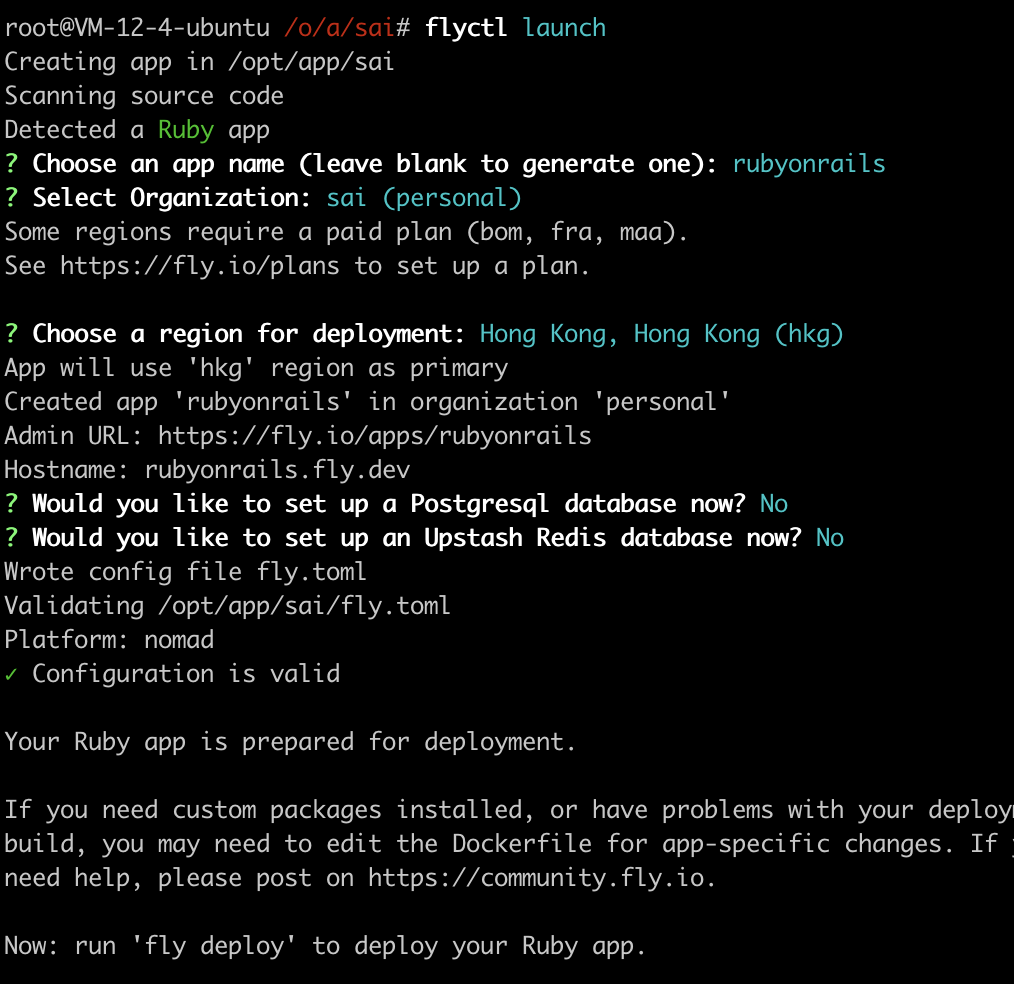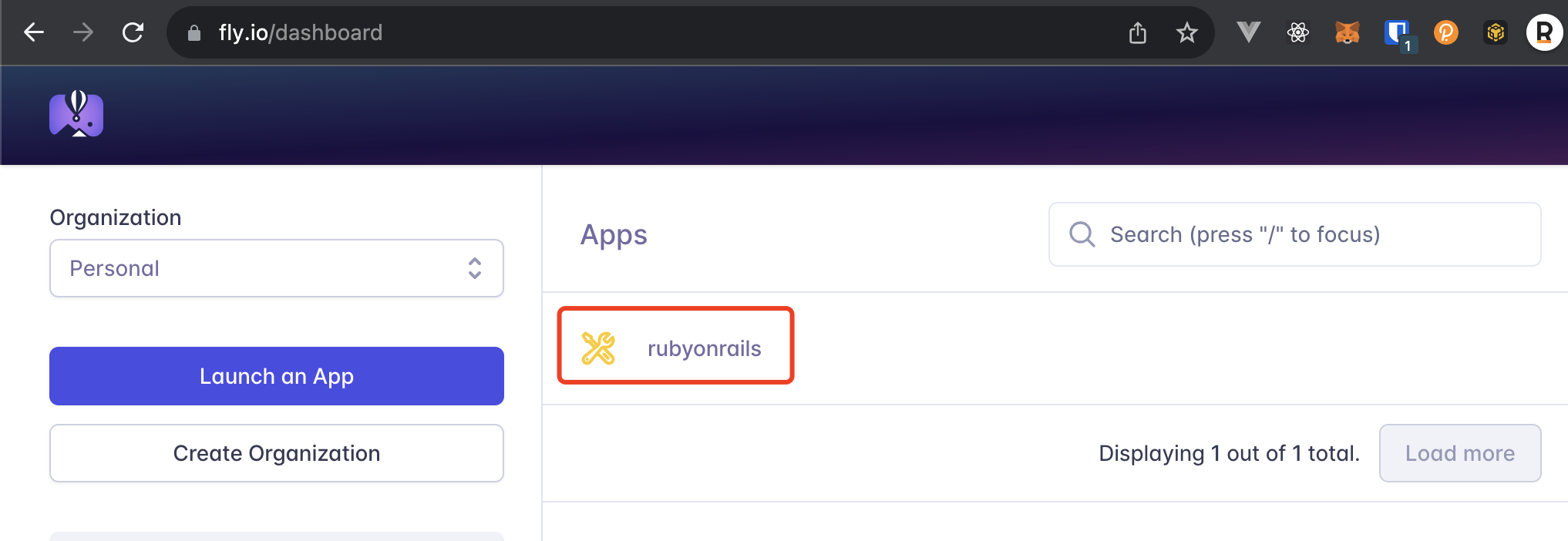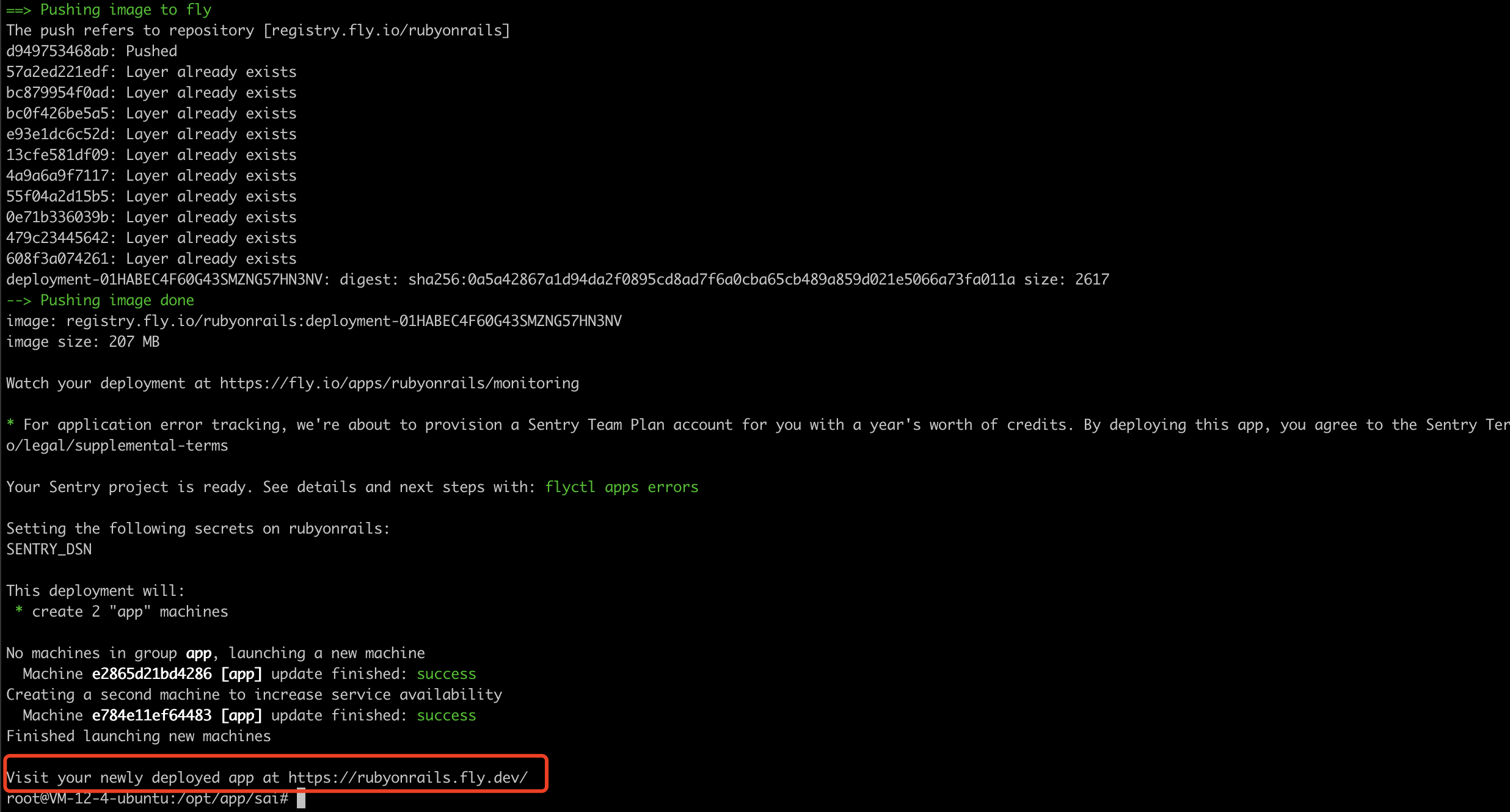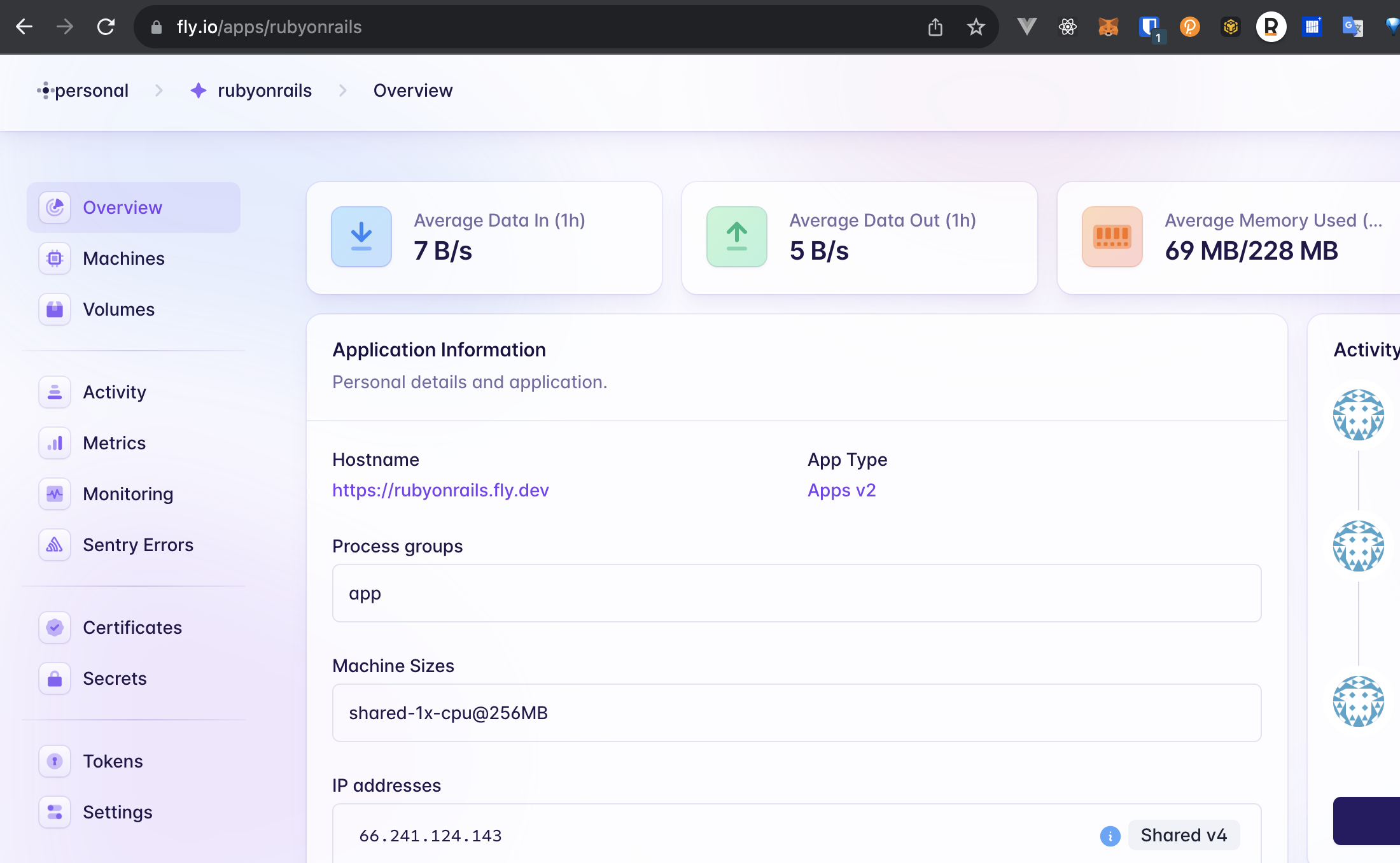fly.io的使用
目前团队采用的部署方式是 Fly.io ,用了一段时间了,记录一下。
Fly.io 是一个基于容器的部署平台,能够保证开发和生产的环境运行在同一环境。
普通部署的话,需要在服务器上安装对应的环境,比较麻烦。而且 Fly.io 部署起来会更方便,价格也会很便宜。
另外主要是它可以提供不同国家的节点,根据需求选择不同的国家节点进行部署。
# 安装命令1 curl -L https://fly.io/install.sh | sh
# 登陆会提示 (点击里面的链接来确认登陆):
1 2 3 4 5 failed opening browser. Copy the url (https://fly.io/app/auth/cli/f71341b207055cb68e89fdcd3b049f0c) into a browser and continue Opening https://fly.io/app/auth/cli/f71341b207055cb68e89fdcd3b049f0c ...(点击这个地址来登陆) Waiting for session... Done successfully logged in as rubyer1993@gmail.com
不要忘了绑定信用卡。
拿一个月前用 fly.io 在 Sinatra 例子部署的演示:
# app.rb 文件1 2 3 4 5 6 7 8 9 10 11 12 13 #!/usr/bin/env ruby require 'rubygems' require 'bundler/setup' require 'sinatra' get '/' do "<h1>我是sai</h1>" end get '/:name' do "<h1>i am sai</h1>" end
# Gemfile 文件1 2 3 4 5 source 'https://rubygems.org' ruby '3.0.3' gem 'sinatra' gem 'puma'
1 2 3 require './app.rb' run Sinatra::Application
运行 flyctl launch。
这里有可能会提示:
Error: Validation failed: Name has already been taken 这里需要你更改 app 的名字 (sai,ruby, rails 都占用了。。。)Error: Your account has been marked as high risk. Please go to https://fly.io/high-risk-unlock to verify your account 这里需要绑定你的信用卡
这里会让选择 app 的名字、服务器所在的节点、数据库等信息,按需要选择就好了
这时候在 fly.io 官网已经可以看到
这个 app 已经创建好了
接下来执行 fly deploy --remote-only
执行完成的数据
1 2 3 4 5 6 7 8 9 10 11 12 13 14 15 16 17 18 19 20 21 22 23 24 25 26 27 28 29 30 31 32 33 34 35 36 37 38 39 40 41 42 43 44 45 46 47 48 49 50 51 52 53 54 55 56 57 58 59 60 61 62 63 64 65 66 67 68 69 70 71 72 73 74 75 ==> Verifying app config Validating /opt/app/sai/fly.toml Platform: machines ✓ Configuration is valid --> Verified app config ==> Building image WARN Failed to start remote builder heartbeat: failed building options: failed probing "personal": context deadline exceeded Remote builder fly-builder-weathered-cherry-206 ready ==> Creating build context --> Creating build context done ==> Building image with Docker --> docker host: 20.10.12 linux x86_64 Sending build context to Docker daemon 866B [+] Building 31.4s (14/14) FINISHED => [internal] load remote build context 0.0s => copy /context / 0.0s => [internal] load metadata for docker.io/library/ruby:3.0.3-slim 1.2s => [base 1/3] FROM docker.io/library/ruby:3.0.3-slim@sha256:086f56a91f8952c50e3a088e174557c7d578e381c9531270a97f6248e8a5d398 2.3s => => resolve docker.io/library/ruby:3.0.3-slim@sha256:086f56a91f8952c50e3a088e174557c7d578e381c9531270a97f6248e8a5d398 0.0s => => sha256:80209e0f3e367b8b27a3d8cbf88b1d3f8a39623b7555de84f8b473940fc1cb68 29.11MB / 29.11MB 0.3s => => sha256:603493fe65bd0f3843878643ba6ce54df4d35bce9e3e5fbd560cd13007c6903c 175B / 175B 0.0s => => sha256:086f56a91f8952c50e3a088e174557c7d578e381c9531270a97f6248e8a5d398 1.86kB / 1.86kB 0.0s => => sha256:1272dbaa1796076e45114e52af11667e7ea15a1d2ace44cfeb911fcc7acd0b5c 1.37kB / 1.37kB 0.0s => => sha256:874a9777434b8b790543604d69aa5f8cd6ecdf45f7b9077d58c87c959efdfe84 5.80kB / 5.80kB 0.0s => => sha256:c229119241af7b23b121052a1cae4c03e0a477a72ea6a7f463ad7623ff8f274b 31.38MB / 31.38MB 0.5s => => sha256:c14a196c62ee705bf37cfab91ea1d171f7b636ffd65269877b758f726189872e 9.99MB / 9.99MB 0.3s => => sha256:365bbf24384cc62b2e96112071ead0fb9d34bb8f42158306d2b628b641fc0068 199B / 199B 0.0s => => extracting sha256:c229119241af7b23b121052a1cae4c03e0a477a72ea6a7f463ad7623ff8f274b 0.7s => => extracting sha256:c14a196c62ee705bf37cfab91ea1d171f7b636ffd65269877b758f726189872e 0.4s => => extracting sha256:365bbf24384cc62b2e96112071ead0fb9d34bb8f42158306d2b628b641fc0068 0.0s => => extracting sha256:80209e0f3e367b8b27a3d8cbf88b1d3f8a39623b7555de84f8b473940fc1cb68 0.5s => => extracting sha256:603493fe65bd0f3843878643ba6ce54df4d35bce9e3e5fbd560cd13007c6903c 0.0s => [base 2/3] WORKDIR /app 0.1s => [base 3/3] RUN gem update --system --no-document && gem install -N bundler 7.2s => [stage-2 1/4] RUN useradd ruby --home /app --shell /bin/bash 0.5s => [build 1/3] RUN apt-get update -qq && apt-get install --no-install-recommends -y build-essential 9.9s => [build 2/3] COPY Gemfile* . 0.0s => [build 3/3] RUN bundle install 8.2s => [stage-2 2/4] COPY --from=build /usr/local/bundle /usr/local/bundle 0.2s => [stage-2 3/4] COPY --from=build --chown=ruby:ruby /app /app 0.0s => [stage-2 4/4] COPY --chown=ruby:ruby . . 0.0s => exporting to image 0.3s => => exporting layers 0.3s => => writing image sha256:f506ae858e2c10ea5b51c85d4bbe861fc675f590d9f453897179db968bb72fde 0.0s => => naming to registry.fly.io/rubyonrails:deployment-01HABDF81PVD00K9EGCHXB82KQ 0.0s --> Building image done ==> Pushing image to fly The push refers to repository [registry.fly.io/rubyonrails] 3f68502190ea: Pushed 57a2ed221edf: Pushed bc879954f0ad: Pushed bc0f426be5a5: Pushed e93e1dc6c52d: Pushed 13cfe581df09: Pushed 4a9a6a9f7117: Pushed 55f04a2d15b5: Pushed 0e71b336039b: Pushed 479c23445642: Pushed 608f3a074261: Pushed deployment-01HABDF81PVD00K9EGCHXB82KQ: digest: sha256:f5c104c56cd0ec61554165fc1c7d54f2c0e9e3824781862f0f62c4792e54c322 size: 2616 --> Pushing image done image: registry.fly.io/rubyonrails:deployment-01HABDF81PVD00K9EGCHXB82KQ image size: 207 MB Watch your app at https://fly.io/apps/rubyonrails/monitoring Provisioning ips for rubyonrails Dedicated ipv6: 2a09:8280:1::2d:7125 Shared ipv4: 66.241.124.143 Add a dedicated ipv4 with: fly ips allocate-v4 Process groups have changed. This will: * create 1 "app" machine No machines in group app, launching one new machine Error: error creating a new machine: failed to launch VM: flyctl version too old, must be at least 0.1.20
这里看到提示了 VM: flyctl version too old, must be at least 0.1.20
执行, fly version update
1 2 3 4 5 6 7 8 Running automatic update [curl -L "https://fly.io/install.sh" | sh] % Total % Received % Xferd Average Speed Time Time Time Current Dload Upload Total Spent Left Speed 100 1735 0 1735 0 0 1307 0 --:--:-- 0:00:01 --:--:-- 1307 ######################################################################## 100.0% set channel to shell flyctl was installed successfully to /root/.fly/bin/flyctl Run 'flyctl --help' to get started
然后重新执行 fly deploy --remote-only
这时候可以看到没有报错,服务已经跑起来了。
这里可以看到服务的详细信息。访问地址:https://rubyonrails.fly.dev/ ( app name .fly.dev)
会在本地生成 fly.toml 文件,内容如下:
1 2 3 4 5 6 7 8 9 10 11 12 13 14 15 16 17 18 19 20 21 22 23 24 25 26 27 28 29 30 31 # fly.toml app configuration file generated for rubyonrails on 2023-09-15T11:07:57+08:00 # # See https://fly.io/docs/reference/configuration/ for information about how to use this file. # app = "rubyonrails" kill_signal = "SIGINT" kill_timeout = 5 mounts = [] primary_region = "hkg" processes = [] [build] [[services]] internal_port = 8080 processes = ["app"] protocol = "tcp" [services.concurrency] hard_limit = 25 soft_limit = 20 type = "connections" [[services.ports]] force_https = true handlers = ["http"] port = 80 [[services.ports]] handlers = ["tls", "http"] port = 443
另外想问 admin 管理访问 https://fly.io/apps/app_name
比如我的就是:https://fly.io/apps/rubyonrails
如果对代码进行修改之后,重新执行部署就会生效:
1 fly deploy --remote-only
# 其他(非主线)进入 console 控制台:
进入 Rails console,在 app 目录下执行:
连接 PostgreSQL 数据库:
1 flyctl postgres connect -a <contract-api-db>
如果想在外部连接:
1 flyctl proxy 5432 -a <contract-api-db>
然后可以通过以下方式连接:
1 psql postgres://database_name:LJNA12LSAI@localhost:5432
或者
1 psql -U database_name -h 127.0.0.1 -p 5432
导入文件到 Fly.io 服务器上的 PostgreSQL:
1 psql -h 127.0.0.1 -U database_name -d database_name -f file.sql
1.Error failed building options: failed probing “personal”: context deadline exceeded
解决方法:需要重新登录 (flyctl auth login)
2.You don’t have net-smtp installed in your application. Please add it to your Gemfile and run bundle install
解决方法:在 Gemfile 中添加以下内容:
1 2 3 gem 'net-smtp' , require: false gem 'net-imap' , require: false gem 'net-pop' , require: false
3. 在部署过程中 rails assets::precompile 执行命令错误
解决方法:注释掉 dockerfile 中的两个 without,同时注释掉下面标记为 # 的部分。
4.remote builder app unavalilable
解决方法:删除 Fly.io 的 fly-builder-nameless-XXX(可以在 Fly.io 的 Apps 查看),然后重新执行 fly deploy 即可。
5. 部署成功后,访问 Fly 生成的 URL 提示 403 或打不开(Rails)
在 config/application.rb 文件中添加生成的 URL,例如:
1 config.hosts << 'rubyonrails.fly.dev'
备注:可以通过这个来排查问题
fly status --all
fly logs -i




